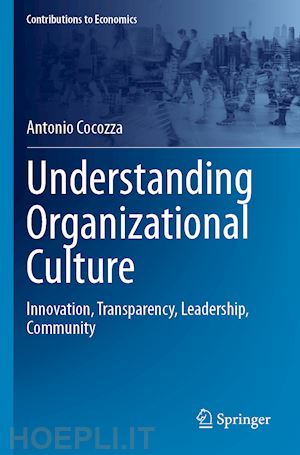
Questo prodotto usufruisce delle SPEDIZIONI GRATIS
selezionando l'opzione Corriere Veloce in fase di ordine.
Pagabile anche con Carta della cultura giovani e del merito, 18App Bonus Cultura e Carta del Docente
Taking a multidimensional approach, this book sheds light on the evolution of organizational studies in a structured and systematic way, against the background of economic and social changes in recent decades. By doing so, the book focuses on the plurality of organizing models as a central concept. This plurality is important to the survival of the firm in response to the growing complexity of the economic, social, and technological innovation that has arisen as a result of globalization.
The book goes beyond the traditional approach to the study of organizations, of a structural and functionalistic type. It investigates the role of cultures and the ethical, symbolic, and value dimensions in the redefinition dynamics of strategic assets, as well as the search for new governance models in innovative organizations. Further, it discusses the role of leadership, in relation to the development of professional groups and the skills necessary for the management of endo-organizational, inter-organizational, and trade union negotiation processes. Finally, the book analyzes the economic, social, and cultural change in societies and discusses how companies and organizations of all types can develop cultures of innovation that may lead to socially inclusive governance.
This book will appeal to students, researchers, and scholars of economics, business, and the social sciences, as well as professionals and practitioners interested in a better understanding of how organizations function in today’s globalized world.
Chapter 1. Introduction.- Part 1: Theories and Concepts.- Chapter 2. The Concept of Organisation and New Interdisciplinary Interpretative Paradigms.- Chapter 3. Economic and Social Changes and the Development of Organisational Theories.- Chapter 4. The Development of Corporate Organisational Models: Innovation, Quality and the Focus on Customer.- Part 2: Tools and Techniques.- Chapter 5. Tools for Analysis, Planning, and Organisational Development.- Chapter 6. Leadership and Management.- Chapter 7. Negotiation.- Chapter 8. Leadership and Organisational Cultures.- Part 3: Case Studies.- Chapter 9. Reforms of the Public Administration and New Person-oriented Organisational Models.- Chapter 10. Entrepreneurial Culture and the Evolution of Organisational Models: the Challenge of the Integral Enterprise Model.- Chapter 11. Conclusions.
Antonio Cocozza is a Professor of Sociology of Work and Organizations at Roma Tre University (Italy), where he also serves as the President of the Degree Course in “Training and Human Resources Development”, as well as the Director of the Master program in “Policies and Tools for Human Resources Management” and in “Organizational and Managerial Processes in Autonomy School”. He is the coordinator of the observatory on school autonomy and a Professor of Business Communication and Human Resources Management at LUISS Guido Carli University, Rome (Italy).











Il sito utilizza cookie ed altri strumenti di tracciamento che raccolgono informazioni dal dispositivo dell’utente. Oltre ai cookie tecnici ed analitici aggregati, strettamente necessari per il funzionamento di questo sito web, previo consenso dell’utente possono essere installati cookie di profilazione e marketing e cookie dei social media. Cliccando su “Accetto tutti i cookie” saranno attivate tutte le categorie di cookie. Per accettare solo deterninate categorie di cookie, cliccare invece su “Impostazioni cookie”. Chiudendo il banner o continuando a navigare saranno installati solo cookie tecnici. Per maggiori dettagli, consultare la Cookie Policy.